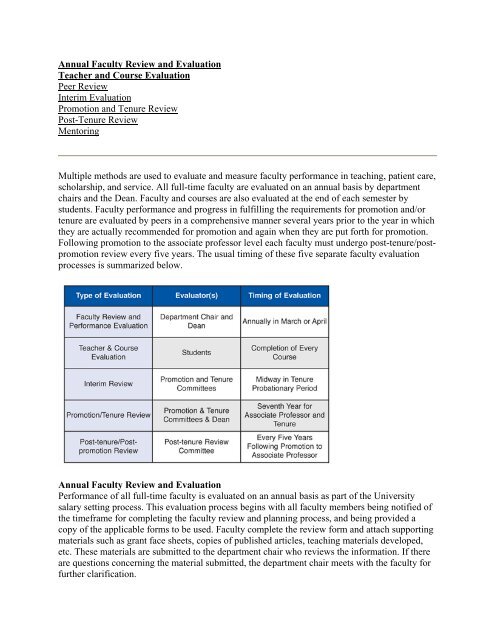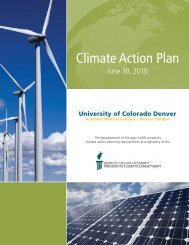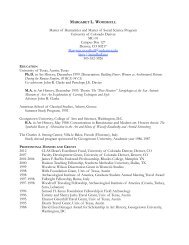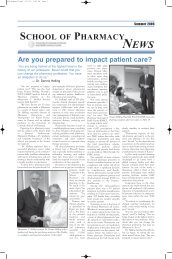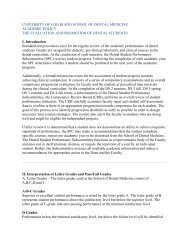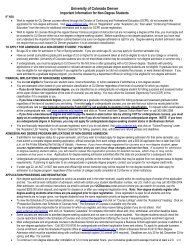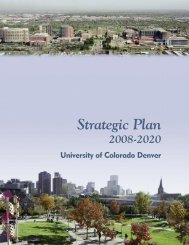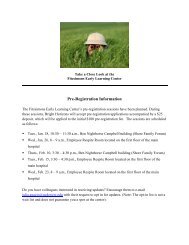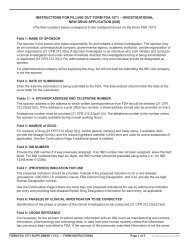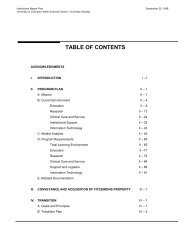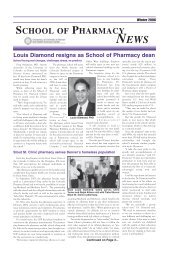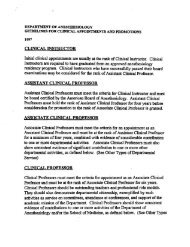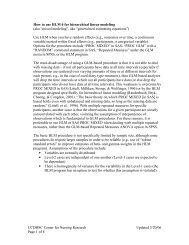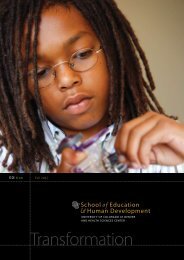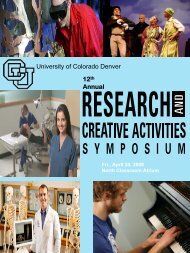Annual Faculty Review and Evaluation Teacher and Course ...
Annual Faculty Review and Evaluation Teacher and Course ...
Annual Faculty Review and Evaluation Teacher and Course ...
You also want an ePaper? Increase the reach of your titles
YUMPU automatically turns print PDFs into web optimized ePapers that Google loves.
<strong>Annual</strong> <strong>Faculty</strong> <strong>Review</strong> <strong>and</strong> <strong>Evaluation</strong><br />
<strong>Teacher</strong> <strong>and</strong> <strong>Course</strong> <strong>Evaluation</strong><br />
Peer <strong>Review</strong><br />
Interim <strong>Evaluation</strong><br />
Promotion <strong>and</strong> Tenure <strong>Review</strong><br />
Post-Tenure <strong>Review</strong><br />
Mentoring<br />
Multiple methods are used to evaluate <strong>and</strong> measure faculty performance in teaching, patient care,<br />
scholarship, <strong>and</strong> service. All full-time faculty are evaluated on an annual basis by department<br />
chairs <strong>and</strong> the Dean. <strong>Faculty</strong> <strong>and</strong> courses are also evaluated at the end of each semester by<br />
students. <strong>Faculty</strong> performance <strong>and</strong> progress in fulfilling the requirements for promotion <strong>and</strong>/or<br />
tenure are evaluated by peers in a comprehensive manner several years prior to the year in which<br />
they are actually recommended for promotion <strong>and</strong> again when they are put forth for promotion.<br />
Following promotion to the associate professor level each faculty must undergo post-tenure/postpromotion<br />
review every five years. The usual timing of these five separate faculty evaluation<br />
processes is summarized below.<br />
<strong>Annual</strong> <strong>Faculty</strong> <strong>Review</strong> <strong>and</strong> <strong>Evaluation</strong><br />
Performance of all full-time faculty is evaluated on an annual basis as part of the University<br />
salary setting process. This evaluation process begins with all faculty members being notified of<br />
the timeframe for completing the faculty review <strong>and</strong> planning process, <strong>and</strong> being provided a<br />
copy of the applicable forms to be used. <strong>Faculty</strong> complete the review form <strong>and</strong> attach supporting<br />
materials such as grant face sheets, copies of published articles, teaching materials developed,<br />
etc. These materials are submitted to the department chair who reviews the information. If there<br />
are questions concerning the material submitted, the department chair meets with the faculty for<br />
further clarification.
Each department chair submits the reviews for departmental faculty to the Dean’s Office for<br />
review <strong>and</strong> scoring. The department chair then meets with the Dean to review <strong>and</strong> discuss the<br />
performance of <strong>and</strong> scoring for each faculty member. They jointly agree on the final<br />
performance rating for each faculty member. The Dean ensures that there is consistency of<br />
ratings across departments. It is the department chair’s responsibility to meet with faculty to<br />
provide feedback on the evaluation of performance in teaching, patient care, research, <strong>and</strong><br />
service <strong>and</strong> on the overall performance rating for the year.<br />
The performance of each faculty member is based in part on the goals established for the faculty<br />
member the previous year <strong>and</strong> the agreed upon manner in which the faculty member’s effort was<br />
to be distributed for the year. All faculty have a Professional Plan that includes one- <strong>and</strong> fiveyear<br />
goals, as well as how the faculty member’s work effort should be distributed in the year. For<br />
example, a faculty member who is to devote 70% effort to research <strong>and</strong> 20% effort to teaching<br />
would have more substantial research goals that someone devoting only 20% effort to research.<br />
When reviewing a faculty member’s annual review <strong>and</strong> performance rating, the department chair<br />
<strong>and</strong> faculty member jointly agree upon new one- <strong>and</strong> five-year goals <strong>and</strong> the distribution of effort<br />
for the following year.<br />
The final step of the annual evaluation <strong>and</strong> salary setting process is the determination of the<br />
salary increases for faculty. A “Base, Supplement <strong>and</strong> Incentive” (BSI) compensation plan was<br />
established by a faculty committee approved by the <strong>Faculty</strong> Senate in October 2004. The BSI<br />
compensation plan provides the basis for determining salary levels for each faculty member. The<br />
base is determined consistent with changes in the mean salary levels of peers. Each rank in each<br />
classification (clinical, research, allied, etc.) has an established base salary level. The established<br />
amount is equivalent to eighty (80) percent of the mean peer salary.<br />
The base is adjusted annually consistent with peer salary changes <strong>and</strong> funding availability. The<br />
supplement portion of a faculty’s compensation is established based on merit, market, equity,<br />
<strong>and</strong> other pertinent factors. The supplement level is individually determined while the base is<br />
rank <strong>and</strong> classification determined. Clinical supplement plans were recently established to<br />
reward <strong>and</strong> incentivize faculty participation in the student clinics <strong>and</strong> other specified academic<br />
activity. The incentive portion of the compensation plan provides incentive bonuses for the<br />
faculties’ participation in the Dental <strong>Faculty</strong> Practice Plan.<br />
After a review of funding availability the Dean determines the amount of monies that are to be<br />
available for the base <strong>and</strong> supplement components of the compensation plan. The criteria for<br />
each component then dictate the annual salary adjustments. The clinical supplement plan<br />
adjustments are implemented as part of the annual salary process <strong>and</strong> also as a separate mid year<br />
adjustment. These adjustments are based on individual <strong>and</strong> clinic/program productivity. The<br />
Dean finalizes <strong>and</strong> approves all salary adjustments after review <strong>and</strong> input from the pertinent chair<br />
persons. The faculty incentive payments from the Dental <strong>Faculty</strong> Practice Plan are made once a<br />
quarter based on clinical earnings.<br />
<strong>Teacher</strong> <strong>and</strong> <strong>Course</strong> <strong>Evaluation</strong><br />
All faculty who participate in a substantial manner in lecture, laboratory, <strong>and</strong> clinical teaching
are evaluated regularly by students. These evaluations are coordinated by the Office of the<br />
Associate Dean for Academic Affairs <strong>and</strong> the evaluation forms used are approved by the<br />
Curriculum Committee. In addition, students evaluate every course, every year. The results of<br />
the evaluations performed by students are provided to the faculty member, his/her department<br />
chair, <strong>and</strong> the Associate Dean for Academic Affairs. <strong>Course</strong> evaluations are also provided to<br />
members of the Dental Curriculum Subcommittee.<br />
Periodic surveys of graduates are also performed by the Office of the Associate Dean for<br />
Academic Affairs. These surveys obtain information from graduates concerning the adequacy<br />
<strong>and</strong> quality of courses <strong>and</strong> recommendations for improving courses. The results of these surveys<br />
are also provided to course directors, department chairs <strong>and</strong> the Dental Curriculum<br />
Subcommittee.<br />
Peer <strong>Review</strong> (Link to Policy)<br />
The School has recently implemented a Peer <strong>Review</strong> for all faculty participating in didactic<br />
course teaching. A peer faculty member will observe at least two lectures per semester <strong>and</strong><br />
document the observance. The documentation (st<strong>and</strong>ard form) will indicate the reviewers’<br />
perspective of the performance of the faculty member. The reviewer will present the<br />
documentation to the faculty member for discussion <strong>and</strong> clarification. The faculty member<br />
acknowledges the review by signing the document. The document is sent to the Associate Dean<br />
for Academic Affairs <strong>and</strong> the department chairperson.<br />
Interim <strong>Evaluation</strong> (Link to Procedures <strong>and</strong> Guidelines)<br />
Interim evaluations are intended to facilitate faculty development consistent with the academic<br />
needs <strong>and</strong> goals of the School of Dental Medicine, <strong>and</strong> in compliance with the University of<br />
Colorado <strong>Faculty</strong> H<strong>and</strong>book. These procedures apply to all faculty in their probationary period,<br />
including faculty with the following types of appointment: tenure track, clinical/teaching (C/T)<br />
track, <strong>and</strong> research track.<br />
Each faculty member below the rank of associate professor is evaluated in a comprehensive<br />
manner at least once during the probationary period apart from the review for promotion <strong>and</strong>/or<br />
award of tenure. The evaluation includes extramural evaluation of the c<strong>and</strong>idate. Each faculty<br />
member is informed orally <strong>and</strong> in writing of the results of the evaluation.<br />
Interim evaluations generally occur in the third or fourth year of a faculty member’s full-time<br />
appointment. If a faculty member receives credit for experience at another institution toward the<br />
probationary period, the interim review would normally be conducted earlier than the third or<br />
fourth year. During the first year of a faculty member’s appointment, the department chair (or the<br />
Dean, if the faculty member is a department chair) <strong>and</strong> faculty member jointly determine during<br />
which year the interim evaluation will be conducted, <strong>and</strong> state the agreed-upon year in writing.<br />
The written agreement is maintained in the departmental files (or the Dean’s Office, if the faculty<br />
member is a department chair) <strong>and</strong> a photocopy forwarded to the Office of Financial Affairs.<br />
Department chairs (or the Dean, if the faculty member is a department chair) advise each faculty<br />
member regarding the criteria <strong>and</strong> st<strong>and</strong>ards that the School of Dental Medicine uses in reaching
a decision about the c<strong>and</strong>idate’s performance, <strong>and</strong> provides the criteria <strong>and</strong> st<strong>and</strong>ards in writing<br />
to each faculty member well in advance of the interim evaluation period. In addition, department<br />
chairs (or the Dean, if the faculty member is a department chair) advise faculty members at least<br />
once each year as to how that individual is progressing toward fulfilling the criteria for<br />
promotion <strong>and</strong>/or tenure.<br />
The criteria for evaluating the performance of faculty include those that are used in the School of<br />
Dental Medicine for promotion <strong>and</strong> tenure of full-time faculty. The faculty member's<br />
accomplishments in teaching, scholarly activities, <strong>and</strong> service are the main focus of the<br />
evaluation. The general guideline in determining acceptable performance is whether the faculty<br />
member's growth <strong>and</strong> accomplishments in these three areas are progressing at a level consistent<br />
with other faculty members at the University of Colorado Denver School of Dental Medicine <strong>and</strong><br />
other similar institutions. The balance of accomplishments in the three areas are also evaluated in<br />
light of the goals of the School <strong>and</strong> department <strong>and</strong> any official changes in job assignment, e.g.,<br />
major increases or decreases in administrative, teaching, or research duties.<br />
External evidence of a faculty member's performance is incorporated in the evaluation. This<br />
evidence includes, but is not limited to, national awards, honors, offices in national or<br />
international academic/professional organizations, editorial functions for scholarly journals,<br />
publications in refereed journals, <strong>and</strong> papers presented at regional, national, or international<br />
meetings.<br />
Promotion <strong>and</strong> Tenure <strong>Review</strong><br />
The manner in which faculty are evaluated for promotion in rank <strong>and</strong>/or tenure is specified in the<br />
Laws of the Regents of the University of Colorado <strong>and</strong> further defined in School of Dental<br />
Medicine <strong>Faculty</strong> Senate documents. Since the promotion <strong>and</strong> tenure process is described in<br />
detail in the response to St<strong>and</strong>ard 3-5, it is only briefly described in this section.<br />
<strong>Evaluation</strong> of faculty performance <strong>and</strong> accomplishments to determine the degree to which<br />
faculty performance satisfies the relevant criteria for promotion in rank or for tenure is a multiphase<br />
process.<br />
This process includes evaluation by a faculty member’s department chair, peers from within the<br />
School, peers from other dental schools <strong>and</strong>/or other professional organizations or agencies, two<br />
committees of peers in the School of Dental Medicine, <strong>and</strong> another campus-wide committee<br />
consisting of faculty from all of the schools on campus, i.e., Medicine, Nursing, Pharmacy <strong>and</strong><br />
the Graduate School. The breadth of the peer review <strong>and</strong> evaluation for promotion <strong>and</strong> tenure<br />
helps ensure that faculty are evaluated in a thorough, comprehensive, <strong>and</strong> objective manner.<br />
Post-tenure <strong>Review</strong> (Link to Procedures <strong>and</strong> Guidelines)<br />
The intent of post-tenure peer review is to facilitate continued faculty development consistent<br />
with the academic needs <strong>and</strong> goals of the University <strong>and</strong> the most effective use of institutional<br />
resources, <strong>and</strong> to ensure professional accountability by a regular, comprehensive evaluation of<br />
the performance of every tenured faculty member <strong>and</strong> every clinical-track faculty member<br />
promoted to the associate professor C/T level <strong>and</strong> above.<br />
Post-tenure reviews are conducted in the fall of each year. <strong>Faculty</strong> will normally be reviewed for
the first time in the fifth year following the granting of tenure. In unusual cases, a faculty<br />
member may be reviewed earlier than the fifth year. <strong>Review</strong> prior to the fifth year must be<br />
initiated by either the faculty member or his/her department chair <strong>and</strong> approved by the dean.<br />
The criteria for evaluating the post-tenure performance of faculty include those that are used in<br />
the School of Dental Medicine for promotion <strong>and</strong>/or tenure of full-time faculty members. The<br />
faculty member's continued accomplishments in teaching, scholarly activities, <strong>and</strong> service<br />
following the granting of tenure/promotion shall be the main focus of the review. The general<br />
guideline in determining acceptable performance is whether the faculty member's growth <strong>and</strong><br />
accomplishments in these three areas have continued at a level consistent with tenured/promoted<br />
faculty members at the University of Colorado Denver School of Dental Medicine <strong>and</strong> other<br />
similar institutions. The balance in accomplishments in the three areas should also be evaluated<br />
in light of the goals of the School <strong>and</strong> department <strong>and</strong> any official changes in job assignment e.g.<br />
major increases or decreases in administrative, teaching, or research duties.<br />
External evidence of a faculty member's performance is incorporated in the review. This<br />
evidence includes, but is not limited to, national awards, honors, offices held in national or<br />
international academic/professional organizations, editorial functions for scholarly journals,<br />
publications in refereed journals, <strong>and</strong> papers at regional, national, or international meetings. The<br />
review may also include evaluations from persons external to the University who have been<br />
selected from lists provided by the faculty member <strong>and</strong> the peer-review group.<br />
The level of post-tenure review undertaken - Regular or Extensive - is determined by the public<br />
record of annual performance ratings for faculty. <strong>Faculty</strong> receiving an evaluation of “meeting<br />
expectations” or better since the award of tenure/promotion or the last post-tenure/postpromotion<br />
review undergoes Regular <strong>Review</strong>. <strong>Faculty</strong> who have a single "below expectations" in<br />
the review period undergo Regular <strong>Review</strong>, <strong>and</strong> must also participate in developing <strong>and</strong><br />
implementing a Performance Improvement Agreement. <strong>Faculty</strong> who receive two "below<br />
expectations" ratings within the previous five years undergo Extensive <strong>Review</strong>.


